Best Places for Shark Cage Diving
Equal
parts terrifying and exhilarating, sharks have long been some of the
most intriguing creatures to cruise the deep, blue sea—so much so that
on TV, we’ve dedicated this entire week to every frightening and fascinating aspect of this fish for 28 years.
Of
course, even more exciting than seeing these sharp-toothed ocean
predators on the tube, is the chance to witness their captivating beauty
up close, in real life.
Some divers (typically those who are more experienced) are brave enough to literally “swim with the sharks,” meaning they do so freely without the protection of a cage.
However,
if you’re curious but not quite ready to get that friendly with these
large sea creatures, a cage dive will likely better suit your appetite
for a shark-viewing adventure.
From
South Africa to Las Vegas (yes, you can see sharks in the middle of the
desert), the following destinations are some of the world’s most
spectacular places for a face-to-face, but cage-protected view of these
truly fascinating fish.
Gansbaai, South Africa
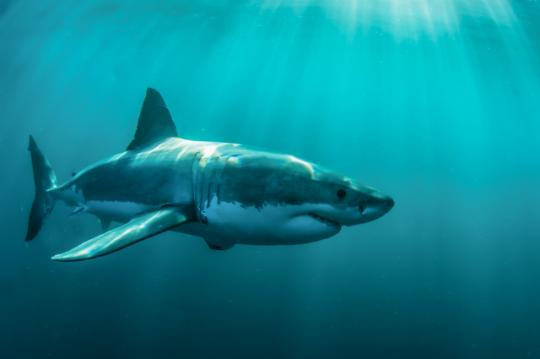
Photo: Shutterstock/Fiona Ayers
Often
referred to as the “Great White Shark Capital of the World” Gansbaii is
a premier cage diving location that promises to offer a truly thrilling
experience. “This area is the best place in the world to get up close
to great white sharks,
and most of the TV documentaries and shows about the great white shark
have been filmed from this location,” said Lina Stock. Stock recently
went cage diving off the coast of Gansbaii and is co-creator and author
of Divergent Travelers.
“The sharks hunt and move through this area year round. There is a
small island off the coast that is home to over 60,000 fur seals, so
during the winter months you can even witness great whites hunting and
breaching out of the water in pursuit of the seals. The cage diving is
first rate with knowledgeable and seasoned people running their
businesses.”
Galapagos Islands
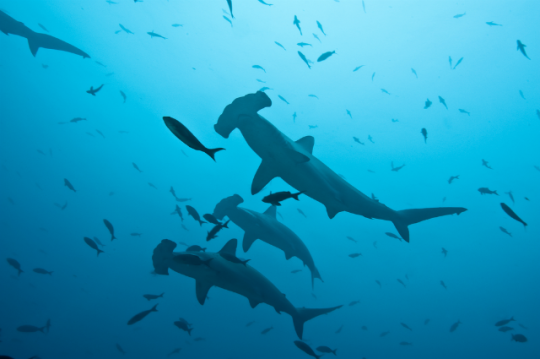
Photo: Shutterstock
With
an extremely unique and diverse wildlife population, a dive into the
waters of the Galapagos offers the chance to encounter several species
of sharks, including hammerhead, Galapagos, dusky and whale sharks.
Plus, while you’re exploring beneath the sea, you may even have the opportunity to see other creatures like sea lions and large schools of tuna.
Shark Reef Aquarium at Mandalay Bay, Las Vegas
No
one would expect to see a shark in the middle of a desert, yet the
Mandalay Bay Hotel and Casino in Las Vegas is home to a 1.3 million
gallon Shark Reef Aquarium,
offering visitors an up-close view of several different shark species,
including sandtiger, sandbar and white tip reef sharks as well as many
other varieties of underwater wildlife. And for certified scuba divers
who want a truly magnified view, the aquarium offers a cage-free “dive with sharks” program as well.
Guadalupe Island, Mexico
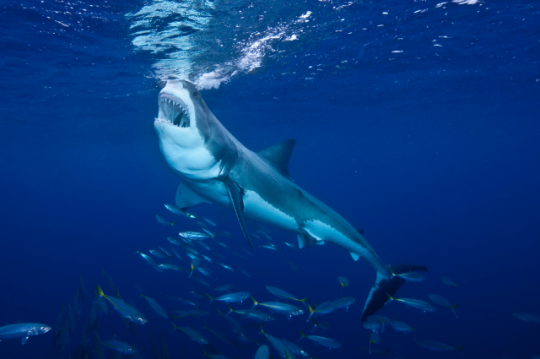
Photo: Shutterstock/Jim Agronick
According to Travel Nation,
Guadalupe Island, or Isla Guadalupe, has become a top viewing spot for
great white enthusiasts over the past 12 years or so. Crystal-clear
underwater visibility and warm water temperatures (averages range from
67 to 72 degrees) make it an especially inviting dive location, as well
as a premier destination for big-game fishing.
Montauk, N.Y.
Yes,
the Atlantic Ocean is home to several species of sharks, too. Maybe
it’s not the most popular location for swimming with these large and
intriguing sea creatures, but a dive off the coast of Montauk in Long
Island, New York offers the chance to see mako, thresher and blue
sharks, sometimes a dozen at a time.
Tiger Beach, Bahamas
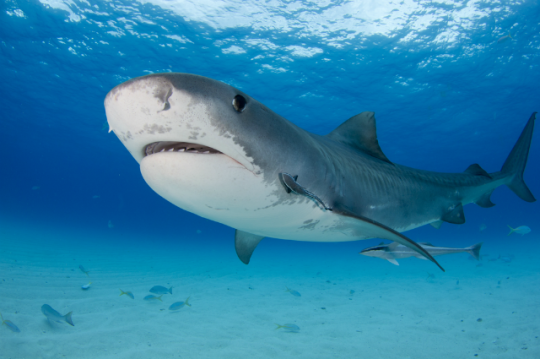
Photo: Shutterstock
Aptly
named, Tiger Beach off Grand Bahama is one of the world’s top spots for
viewing, you guessed it, tiger sharks. Most diving expeditions here
guarantee an up-close sighting of these toothy creatures, which can grow
up to about 16 feet in length.
Cocos Island, Costa Rica
According to Gear Patrol
reporter Jason Heaton, Costa Rica’s Cocos Island is the best place in
the world to see hammerhead sharks. During the summer months, it’s not
uncommon to come across large schools of these funny-faced fish and the
area is also home to other species like white tip, Galapagos and whale
sharks.
Farallon Islands, Calif.
Along
with other marine wildlife, some of the world’s largest great white
sharks visit South East Farallon Island in the fall to feed on elephant
seals before making a lengthy trans-pacific migration. Divers here are
almost always guaranteed a thrilling and theatrical encounter.
Organizers at Shark Diving International say breach attacks often occur
right in front of cages.
Neptune Islands, South Australia
Another
well-regarded destination for great white viewing, large populations of
sea lions call these South Australia islands home, which means they
also serve as year-round feeding grounds for hungry sharks. According to
Travel Nation, the ocean water here is clear and clean, making it an ideal backdrop for shark-viewing adventures.
Point Judith, R.I.
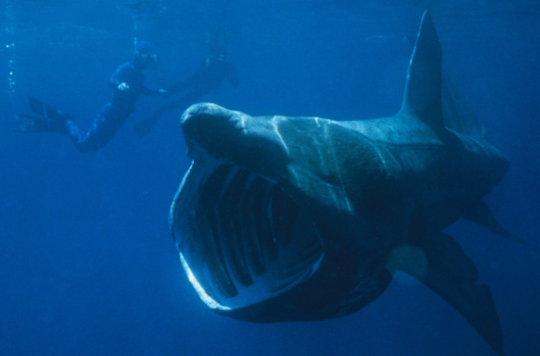
Photo: Public Domain via Wikimedia Commons
Another
popular spot for shark viewing in the Atlantic, Point Judith offers
adventurous divers the opportunity to come face to face with both blue
and mako sharks. Blue sharks are the most common, though, and according
to organizers at Snappa Charters, they’re also considered one of the
most cooperative species when it comes to snapping photos. Additionally,
excursions in June and early July offer the chance to catch a glimpse
of the lesser known and essentially un-harmful basking shark (pictured
here).
Osprey Reef, Australia
For experienced divers ready for an upgrade to a cage-free adventure, travel writer Charli Moore
recommends a seven-day live-aboard dive exploring the islands of the
Coral Sea, outer Great Barrier Reef and Osprey Reef, located about 217
miles off the coast of Cairns in Queensland. “Famed for a shark feed
dive— no cage and a reef amphitheater looking out over a 1,000-meter
drop off—the bait brings in anywhere from 30 to 70 sharks,” Moore said.


No comments:
Post a Comment